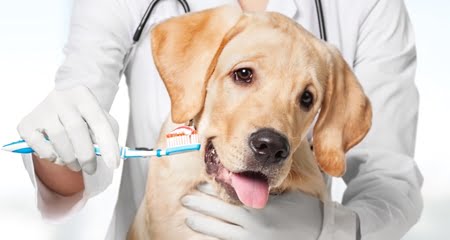Not Just You But Your Dog Needs A Dentist Too

Can dogs suffer from oral problems? According to the information developed for veterinarians and their clients by the American Veterinary Medical Association, the American Veterinary Dental Association and Hills Pet Nutrition, Inc. as part of Pet Dental Health Month, yes!
How to prevent them:
Gum Diseases:
Gum diseases are not just extremely painful, but may also lead to more serious problems like heart and kidney diseases, if not treated in time. By taking care of his/her teeth from a very early age, you can save your dog from a gum disease at a later stage of their life.
Cavities:
Although rare, dogs do have the risk of getting cavities, particularly when given sugary treats. To save your dog from a cavity in the future, take care of their diet. Give them only the food designed for them and, no matter how much they love it, no sugar please!
Tooth breakage:
The most common cause of tooth breakage in dogs is chewing on hard objects. Watch out for how your dog chews a new toy, and if they are trying to crack it with their teeth, don’t let them play with it. If they are aggressive chewers, select softer toys or toys that they cannot get their mouth around.

But when it comes to your canine children, identifying a potential dental health problem could be challenging. So, here are some signs to look out for:
Stinky breath:
Well, a dog’s breath is always slightly stinky, but it’s not normal for his breath to smell rotten. If your dog’s breath smells stinkier than usual, it is a sign of bacterial growth in his/her mouth, and a dental examination is needed.
When they stay away from their favorite chew toy:
The signs of dental pain in dogs can be quite subtle, and they might continue to eat normally even when their teeth hurt. But reluctance to play with chew toys or grasping objects in their mouth, and even favoring one side of their mouth when eating are the signs to look out for.

When they are lethargic:
If your dog has slowed down, and the veterinarian did not detect anything from a routine test, take him/her for a dental checkup.
Finally, a few points to keep in mind:
- Most dogs need to go for dental cleaning once they are 3 years old, and yearly after that.
- Although most dogs are born with sufficiently straight teeth, some of them might need braces, to ensure proper chewing.
- Hard kibbles are slightly more effective in preventing plaque. Don’t forget to consult your veterinarian about what kinds of food reduce the possibility of plaque.
- Your dog needs brushing to keep away plaque and tartar.

So dear dog parents, ask your veterinarian for ways to take care of your dog’s dental health, today!



